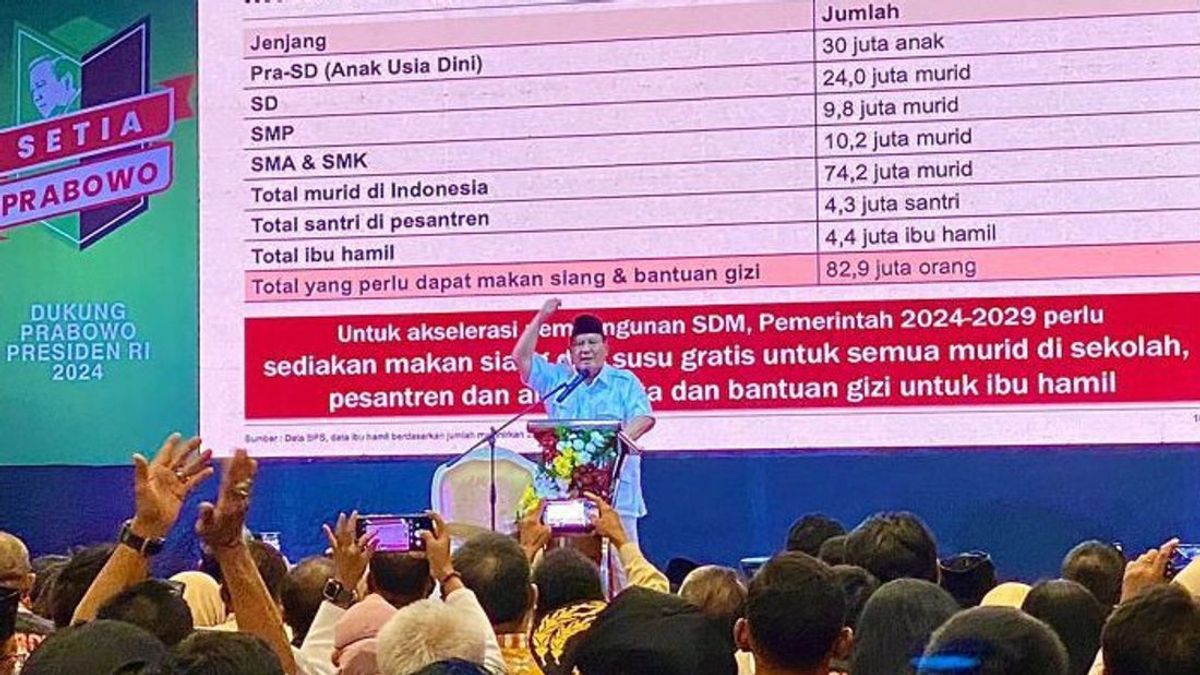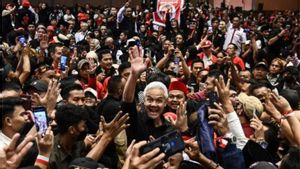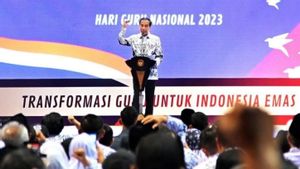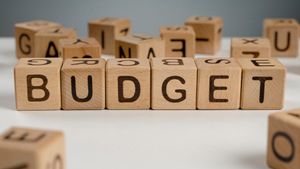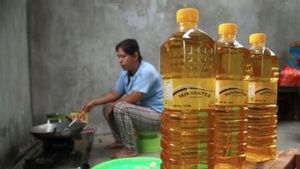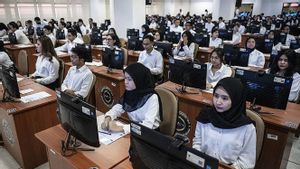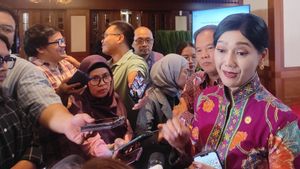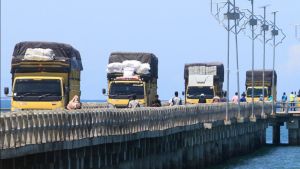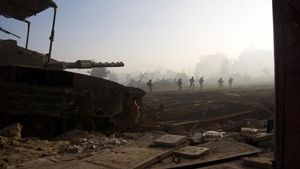JAKARTA Pair of presidential and vice presidential candidates number 2 Prabowo Subianto-Gibran Rakabuming Raka reiterated his promise regarding free lunch and milk if he wins the presidential election (Pilpres) next year.
The program was again delivered by the Secretary of the Prabowo-Gibran National Victory Team (TKN), Nusron Wahid. He said as many as 82.9 million Indonesian children would receive free lunch and milk if the Prabowo-Gibran pair were elected as president and vice president next year.
The free lunch and milk program has started to be socialized by TKN on the first day of the campaign, November 28. The chairman of TKN, Rosan Roeslani, hopes that the community will begin to benefit from the program.
Prabowo Subianto said the free lunch and milk program for school children was carried out to realize superior Indonesian Advanced Human Resources (HR) in 2045.
However, despite its noble goal, the program launched by the Prabowo camp was actually evacuated by many parties, including the Director of the Center of Economics and Law Studies (Celios) Bhima Yudhistira.
According to Bhima, the free lunch program will be difficult to realize because it requires a very large budget. Not only that, Bhima also assessed that for now the free lunch program is not an urgent matter.
He said that now there are more mothers and babies who need to be free from stunting.
"Don't talk about free lunch first, there are still many more urgent needs, one of which is the acceleration of stunting reduction which is still 21.6 percent," Bhima told VOI.
Previously, through its official website, the Ministry of Health announced the results of the Indonesian Nutrition Status Survey (SSGI), where the prevalence of stunting in Indonesia fell from 24.4 percent in 2021 to 21.6 percent in 2022.
However, the prevalence of stunting in Indonesia is still less than the standards of the World Health Organization, which must be less than 20 percent. For this reason, President Joko Widodo said Indonesia is targeting stunting prevalence to be 14 percent by 2024.
On the same occasion, Bhima also mentioned education in Indonesia. According to him, the free school program is more urgent than giving free lunch.
Bhima also suggested freeing single tuition fees or UKT for state universities throughout Indonesia. He gave the example of Chile, which has started to progress in making universities free.
"But suggestions for Pak Prabowo need to be found where the money came from. Mr. Prabowo's program is very large," said Bhima.
Providing free lunch and milk to school children requires a lot of money. According to data from the Ministry of Education, Culture, Research, and Technology (Kemendikbud Ristek), the number of students in Indonesia in the odd semester of the 2023/2024 school year reached 53.14 million people. Almost 50 percent of this figure is elementary school students, which is 24.04 million.
Digital economy researcher from the Institute for Development of Economic and Financial (Indef), Nailul Huda also doubts the free lunch program.
Nailul Huda's doubts are based on the limited capacity of the State Revenue and Expenditure Budget (APBN). He predicts that it will take IDR 400 trillion per year to run a free lunch program.
"If we assume government spending will reach Rp3,200 trillion, it means that it is 8 percent of the state budget. This is very large," he said, quoted from Kompas.
In addition to the very large budget, Nailul Huda also said that this program has the potential to be not on target, because all people get free lunch. In addition to the potential for wrong targets, free lunch also has the opportunity to become a new corruption land.
"With this very jumbo budget, it is possible that corruption will occur from the level of ministries, agencies, to the level of schools," he said.
On the other hand, the General Chairperson of the National Young Entrepreneurs Volunteer DPP (Repnas) Anggawira said the free lunch program for children not only increases children's nutrition, but can also improve the welfare of micro, small and medium enterprises (MSMEs).
SEE ALSO:
In addition to culinary MSMEs, Anggawira also said that MSMEs providing food raw materials, in this case lunch materials, also benefited from the existence of the program.
This can create opportunities for MSMEs to participate in the provision of food or raw materials for the lunch program, supporting economic growth in communities around schools. However, it is important to ensure that local MSMEs are engaged fairly and sustainably in the implementation of the program," said Anggawira.
The English, Chinese, Japanese, Arabic, and French versions are automatically generated by the AI. So there may still be inaccuracies in translating, please always see Indonesian as our main language. (system supported by DigitalSiber.id)
